Pakistan’s election explained in 300 words
Imran Khan and former PM Nawaz Sharif go head to head as turbulent election campaign draws to a close
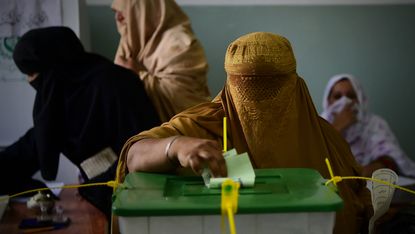
Citizens of Pakistan headed to polling stations today to determine the country’s next leader.
Voting began at 8am local time (4am BST) and closed at 6pm (2pm BST).
Opinion polls indicate that the vote will come down to the wire between the parties of ex-cricket star Imran Khan and disgraced former prime minister Nawaz Sharif.
Subscribe to The Week
Escape your echo chamber. Get the facts behind the news, plus analysis from multiple perspectives.

Sign up for The Week's Free Newsletters
From our morning news briefing to a weekly Good News Newsletter, get the best of The Week delivered directly to your inbox.
From our morning news briefing to a weekly Good News Newsletter, get the best of The Week delivered directly to your inbox.
Here’s what you need to know:
Who is in the running?
“Outspoken cricketer-turned-politician” Khan is seeking to lead Pakistan, having “appealed to the masses, especially the younger generation”, with promises of “rooting out corruption” to create a “new Pakistan”, says Al Jazeera. The candidate of the centre-right PTI, Khan has vowed to create an Islamic welfare state.
His main challenger is Sharif, whose conservative PLM-N party is currently run by his brother Shehbaz. Nawaz was recently jailed for ten years following a corruption scandal uncovered by the Panama Papers in 2016.
Why is it important?
Since gaining independence in 1947, Pakistan has “oscillated between civilian and military rule”, the BBC says, adding: “This election will mark the second time that one civilian government has handed power to another after serving a full term - a historic landmark.”
However, the PML-N claims there has been a targeted crackdown of its activities by the intelligence services, with the help of the courts.
Has it been peaceful?
No. At least 31 people were killed in a bombing near a polling station in the western city of Quetta today, with other attacks reported across the country.
On 16 July, at least 149 people were killed in a suicide bombing targeting a candidate in the southwestern city of Mastung.
Army officials said that up to 370,000 troops had been deployed to ensure a “fair and free” election, while police estimate that the total security force at 800,000, CNN reports.
Create an account with the same email registered to your subscription to unlock access.
Sign up for Today's Best Articles in your inbox
A free daily email with the biggest news stories of the day – and the best features from TheWeek.com
-
 Can Trump get a fair trial?
Can Trump get a fair trial?Talking Points Donald Trump says he can't get a fair trial in heavily Democratic Manhattan as his hush money case starts
By Harold Maass, The Week US Published
-
 Crossword: April 24, 2024
Crossword: April 24, 2024The Week's daily crossword
By The Week Staff Published
-
 Sudoku hard: April 24, 2024
Sudoku hard: April 24, 2024The Week's daily hard sudoku puzzle
By The Week Staff Published
-
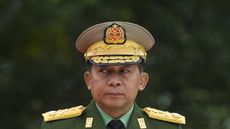 Myanmar: the Spring Revolution and the downfall of the generals
Myanmar: the Spring Revolution and the downfall of the generalsTalking Point An armed protest movement has swept across the country since the elected government of Aung San Suu Kyi was overthrown in 2021
By The Week Staff Published
-
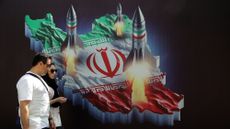 Israel hits Iran with retaliatory airstrike
Israel hits Iran with retaliatory airstrikeSpeed Read The attack comes after Iran's drone and missile barrage last weekend
By Peter Weber, The Week US Published
-
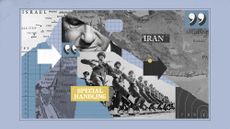 Is there a peaceful way forward for Israel and Iran?
Is there a peaceful way forward for Israel and Iran?Today's Big Question Tehran has initially sought to downplay the latest Israeli missile strike on its territory
By Sorcha Bradley, The Week UK Published
-
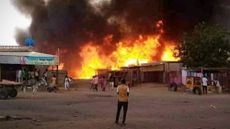 Sudan on brink of collapse after a year of war
Sudan on brink of collapse after a year of warSpeed Read 18 million people face famine as the country continues its bloody downward spiral
By Peter Weber, The Week US Published
-
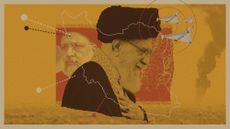 How powerful is Iran?
How powerful is Iran?Today's big question Islamic republic is facing domestic dissent and 'economic peril' but has a vast military, dangerous allies and a nuclear threat
By Harriet Marsden, The Week UK Published
-
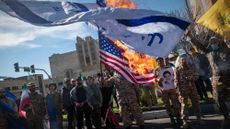 US, Israel brace for Iran retaliatory strikes
US, Israel brace for Iran retaliatory strikesSpeed Read An Iranian attack on Israel is believed to be imminent
By Peter Weber, The Week US Published
-
 How green onions could swing South Korea's election
How green onions could swing South Korea's electionThe Explainer Country's president has fallen foul of the oldest trick in the campaign book, not knowing the price of groceries
By Sorcha Bradley, The Week UK Published
-
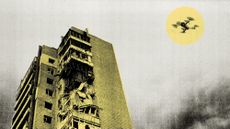 Ukraine's battle to save Kharkiv from Putin's drones
Ukraine's battle to save Kharkiv from Putin's dronesThe Explainer Country's second-largest city has been under almost daily attacks since February amid claims Russia wants to make it uninhabitable
By Sorcha Bradley, The Week UK Published